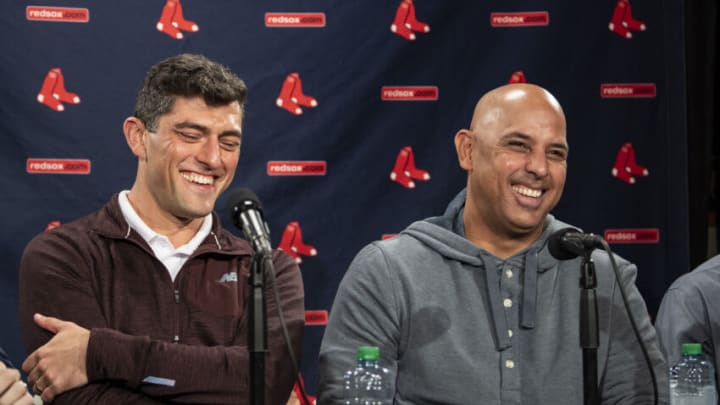The Boston Red Sox appear to be attempting to put together the least impactful offseason possible.
It’s a drag to pen articles that have no enthusiasm about this team and their lackadaisical offseason proceedings. The offseason is when championships are won, and all that’s left to do is play the games.
Last offseason, Chaim Bloom fashioned an ALCS team out of practically nothing. With shrewd signings, trades, and even Rule 5 draft picks, Bloom maximized the value of every single player, and it resulted in an overachieving 2021 Boston Red Sox squad. The lesson that was learned; never count Mr. Bloom out.
This offseason has been a polar opposite. The Sox have only signed five major league free agents to this point, and none of them have been particularly well-received. As of this moment, it isn’t looking too darn good for the Sox. So let’s have a look at their offseason thus far.
The Boston Red Sox have managed to regress this offseason
Both prior to the lockout and now after it has ended, Red Sox fans have been chomping at the bit to see some positive, exciting movement from the front office. To date, fans have just had to keep chomping, because not much is happening. The excitement level is at about a two out of 10.
After the head-scratching trade of one of the team’s best offensive players in 2021, Hunter Renfroe, to the Milwaukee Brewers for 2021 offseason departee Jackie Bradley Jr., many fans were confused by the direction of the team.
OK, two prospects were acquired in the deal, which is nice yes, but are they going to contribute one iota to the 2022 major league squad? The answer is clear; no they are not.

Want your voice heard? Join the Chowder And Champions team!
Then while hope sprang eternal that the Sox would almost certainly either re-sign slugger Kyle Schwarber or go get promising Japanese slugger Seiya Suzuki to replace Renfroe’s offense, neither happened.
Time is now running out for anything meaningful to happen this offseason other than the highly unlikely mega-splash for a top player like Carlos Correa. Let’s face the facts; the Red Sox penurious ownership (for a big market team, that is) isn’t going to sanction one of those 10-year deals.
Frankly, they shouldn’t have to either. That’s why the deals for guys like Schwarber and Suzuki made so much sense. They were for a reasonable amount of years for the ages of the players, and while significant in dollars, should not have been back-breaking or budget-busting for a big market team.
The Boston Red Sox losing out on Kyle Schwarber and Seiya Suzuki is troubling
Schwarber signed with the Philadelphia Phillies for $79M on a 4-year deal. While that’s not chump change, it’s a manageable amount for a player in his prime for a not-so-long period of time. It was perfect, frankly, even if somewhat more annually than you’d have liked to pay.
In Suzuki’s case, he signed with the Chicago Cubs. His deal was also very reasonable in a baseball sense. (There was also a posting fee of $15M to his former team, the Hiroshima Toyo Carp.) Bleacher Nation provides the particulars:
"Here’s the full breakdown on the Cubs’ free agent deal for Japanese slugger Seiya Suzuki – which comes with a full no-trade clause – per Mark Feinsand:2022: $7M (plus a $5M signing bonus)2023: $17M2024: $20M2025: $18M2026: $18M"
While no one other than the players and their agents knows if either player seriously considered Boston, money talks, and both deals should have been right in the wheelhouse of the big-market Boston Red Sox.
They both were shorter deals (the key), for reasonable money, and for good players. That the Red Sox couldn’t get either of those deals across the finish line (if they actually tried) is systemically distressing.
It means that one of the following is true. First, it could mean that the team is not willing to spend that kind of money on good players. Second, it may mean that good players are not particularly interested in playing in Boston. Either is a terrible optic for the team, for Bloom, for the Boston Red Sox ownership, and especially for the fans. It’s worse if both are true.
To sum it up, if Boston is no longer a destination even for good, if not great players, the team is in serious trouble unless they start producing starters in their farm system. The second possibility is even more ominous. That would be the ownership has emotionally and financially checked out. They’ve closed their checkbooks for Bloom and basically hung him out to dry.
If that is the case, this space will again entreat the ownership to please do one thing for the loyal Red Sox fandom. That would be to sell the team. Sell the team to a deep-pocketed owner (Elon Musk or Jeff Bezos would be just fine), take your three or four billion dollars, say farewell, and dwell in Liverpool. It’s just the honorable thing to do.
